Even before the pandemic accelerated the demand for remote work, it was already a popular movement. Companies offering remote or hybrid working strategies were often the first to attract top talent, and they had the freedom to access skills from anywhere in the world.
The benefits of remote work were its primary draw. Remote working essentially involves being able to do your job from anywhere—and that kind of flexibility certainly seemed appealing to many. “Working from home” didn’t literally mean you had to be working from your living room. It just meant you had the option to work anywhere in the world—whether it’s from co-working spaces, cafes, or even traveling to exotic locations on a remote work visa.
While employees love the freedom remote working offered, employers benefit from wider access to talent and more productive staff. One study found 30% of remote workers felt more engaged and productive working from home.
As remote work becomes more commonplace, let’s dive into the benefits of remote work.
The Rise of Remote Work Opportunities
While remote work isn’t an entirely new concept, it had gained significant steam in the last couple of years
When 2020 arrived, bringing with it the challenges of COVID-19, remote work became a necessity for many companies who needed to continue operations amid the pandemic.
Lockdowns gave companies a chance to test the benefits of remote working for themselves, and many have decided to continue the strategy going forward.
62% of workers around the world now work remotely at least occasionally, and 16% of companies have gone fully remote. Studies conducted into the advantages of remote working have found the right strategies can enhance everything from productivity to staff retention. In fact:
- Stanford found employee performance improved by 22% when staff members were able to work remotely.
- Employees working from home report being happy with their job 22% more often than workers who are always in an office environment.
- Companies offering remote work opportunities have a 25% lower turnover rate among top talent.
Let’s explore some of the top benefits of remote work for both employers and their staff.
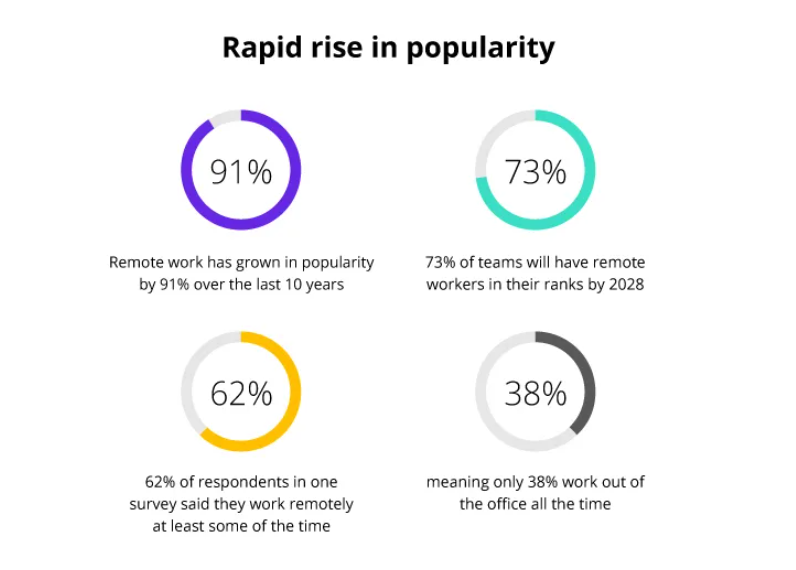 Source: Wrike
Source: Wrike
The Top 10 Benefits of Remote Work for Employees
Employees have long valued the concept of remote work. According to an Inc report, 9 out of 10 people working remotely now want to continue doing so forever. This is because remote workers have more flexibility, autonomy, and freedom than their in-office counterparts.
While the biggest benefits of remote work for employees may differ depending on who you ask, some of the most significant advantages recorded include:
Better Work/Life Balance
One of the biggest benefits of remote work for many employers is the freedom to adjust their schedule and routine to suit their needs. Many companies offering flexible schedules allow staff members to start and end their work day whenever they choose, provided they meet pre-set deadlines.
The flexibility offered by a remote working schedule means people can enjoy more freedom to manage the other priorities in their lives, like looking after children, going to the gym, or just completing tasks around the home. Plus, it means employees can work when they feel the most productive, ensuring they complete their tasks more easily.
Control over the Commute
One of the worst parts of the work day for many employees is the commute. The average one-way commute time for a US employee is around 27.1 minutes. This means most staff members waste around 5 hours of their lives each week just getting to and from work. Not to mention, the average commute is a constant source of stress and various health issues for employees.
According to one study, difficult commutes lead to worse sleep, back pain, increased anxiety, higher cholesterol, and even blood pressure spikes. With the freedom to work from home, employees can use their commute time on other more beneficial practices, like listening to music to wind down before work, meditating, or just spending time with family.
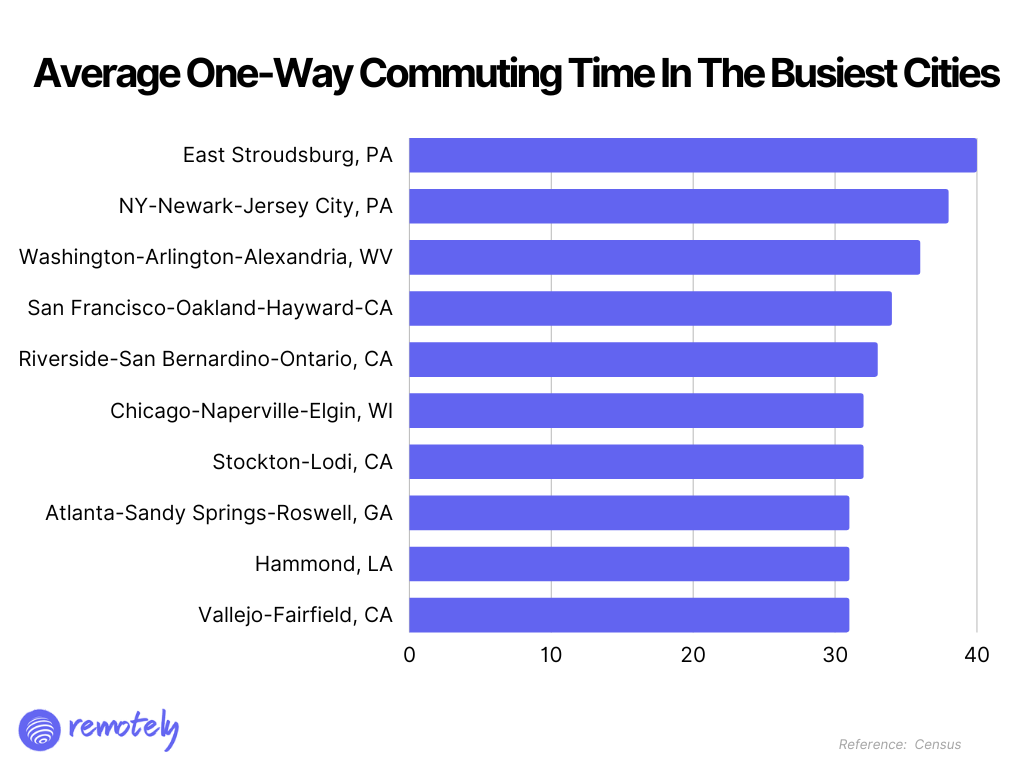
More Workplace Opportunities
The rise of remote work as a common option among businesses is leading to new opportunities for the talent market. Today’s professionals aren’t limited to finding jobs that match their skills in their local area. They can apply to work for businesses all around the world.
This is particularly valuable for employees living in rural towns and environments where the call for their skills may not be particularly great. Remote work allows employees to find the best possible jobs for their skill sets, wherever they are in the world.
Improved Inclusivity
Remote working opportunities are also excellent for those who might otherwise struggle to find the right workplace due to personal needs. People with disabilities, chronic illnesses, and other ailments can easily work from home, without having to worry about a daily commute. Remote work gives people who would struggle to work for a traditional company more options.
If an employer commits to hiring people from all over the world as part of their remote working strategy, it can also give employees an opportunity to connect with and learn from different cultures. Remote work is great for expanding your horizons.
Reduced Cost of Living
Cost of living crises are a major issue among employees today. Fortunately, remote work could offer a solution. Going to work each day puts a strain on our financial resources. Most employees need to pay for gas, car maintenance, food, and other expenses just to be at work. Some studies show the average American spends up to $5,000 a year just on the daily commute.
The money employees save on going to work can go towards paying the cost of increasing bills, saving for important goals, and even planning for retirement.
 Source: HowMuch.net
Source: HowMuch.net
Earn more money
Not only can remote work help to save money for people who don’t have to commute to work each day, but it could be an opportunity to earn more too. One study found people who work remotely generally make around 1.9% more than their office workers.
With remote work, it’s possible to apply for jobs from a wide range of different companies, and seek out a more competitive salary. Additionally, there’s more freedom to take on part-time roles alongside your regular job if you want to earn extra cash.
Reduced environmental impact
Around 9 in 10 people across the globe want to become more sustainable and environmentally friendly. However, things like driving to work and operating in an office environment on a regular basis can have a negative impact on the environment.
Working remotely can help people to achieve their goals for sustainability, reducing the emissions from commuting alone by around 70 to 140 billion miles each year. More sustainable living also has a direct impact on the health of communities, by reducing air pollution.
Personalized Office Environment
Different people work better in different environments. Some need a highly isolated space where they can focus on mentally-challenging tasks. Others prefer to be in a laid-back setting where they can listen to music as they work.
Remote work allows employees to choose the working environment that suits them best. One of the biggest benefits of remote work is you’re free to choose your ideal office space. You can play your music, set the temperature however you like, and even arrange your desk according to your needs.
Improved Happiness
Remote workers are generally happier than their office-based counterparts. The various benefits of remote work, from a reduced need to commute to the office, to more freedom over schedules generally make us feel more satisfied in our roles.
Studies show remote work can improve happiness among employees by around 20%. This also leads to greater productivity and efficiency.
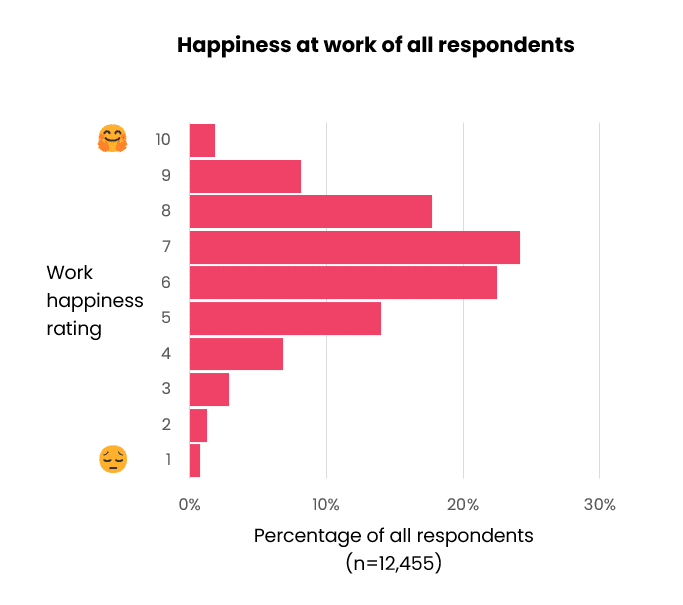 Source: TrackHappiness
Source: TrackHappiness
Better Health
One of the biggest benefits of remote work for employees is it gives them more opportunities to make healthy choices in their lives. They don’t have to rush to work each morning, ignoring breakfast, or eat fast food at lunch. Remote workers can even dedicate time to exercise during their day.
According to studies into remote working strategies, people who work outside of the office tend to sleep better, experience less stress, and feel healthier in general.
The Top 10 Benefits of remote work for employers
Remote work offers a host of benefits to employees, which is one of the main reasons why it’s been such a sought-after practice for so long. However, many employers have been laboring under the misconception that remote work isn’t a positive thing for their companies.
Fortunately, the pandemic showed remote working opportunities can be just as beneficial to businesses as it is to their staff. Some of the biggest benefits of remote work for employers include:
More Productive Staff
Many employers entering the world of remote work for the first time in recent years were concerned their employees would simply stop working if they didn’t have supervisors looking over their shoulder. However, studies have shown remote staff are just as productive, if not more productive than their in-office counterparts.
According to one report, remote employees devote more time to work-based tasks than their counterpart, and feel more productive at work. Another report from Stanford found remote workers have a productivity boost equivalent to one day of extra work compared to their office counterparts.
More Committed staff members
Employees working remotely often want to prove they can be trusted to deliver excellent results, even when they’re not in the office. This means they’re more likely to go above and beyond compared to other team members. One study found 55% of remote employees work more hours remotely than they do in the physical office.
Because remote employees are happier at work, they’re also more likely to work harder on any task. This could mean companies can benefit from more efficient and valuable staff members.
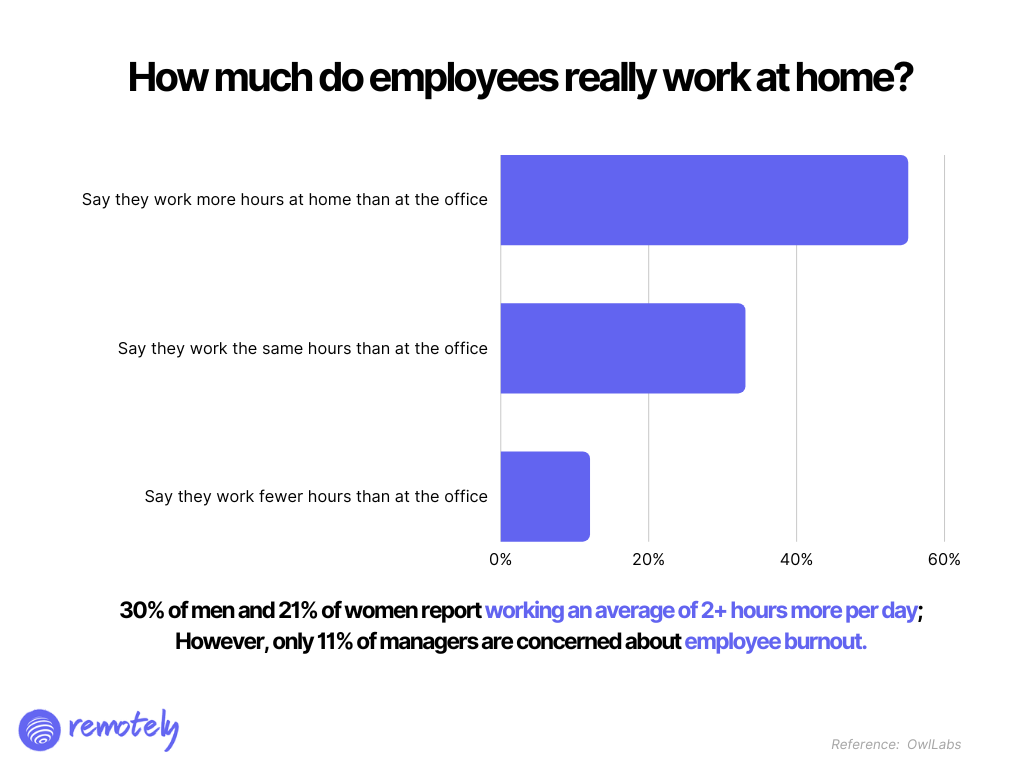
Lower Overhead Costs
One of the major benefits of remote work often quoted by employers is that allowing employees to work flexibly can save teams significant money. According to a Global Workplace Analytics report, employers supporting remote work even part-time can save around $11,000 per year for each employee. This cost-saving is a result of various factors.
For instance, employers of remote staff members don’t have to pay as many overheads for office equipment and real estate. They can also cut costs on travel, by hosting meetings and conversations in the cloud with other colleagues and stakeholders.
Access to A Bigger Talent Pool
Traditionally, most companies have limited their hiring pool to people who can physically commute to the office. This means it has often been extremely difficult to find the right people with the correct talents to join your organization. However, with remote working solutions, employers can seek out talent anywhere in the world, giving them much more freedom.
Employers can even hire different employees from different parts of the world to create an around-the-clock team. For instance, you could hire people from different time zones to give customers a complete 24/7 service experience.
A Stronger Employer Brand
Finding the right talent isn’t the only challenge employers face in today’s skills-short environment. Many businesses are struggling to convince the best candidates to choose them over the competition. However, remote work can be an excellent, and attractive benefit to employees.
Studies have found around 50% of people would consider leaving their job if they weren’t offered a remote working schedule. However, around 61% of employees would be willing to take a pay cut just to continue working for a brand offering flexible schedules.
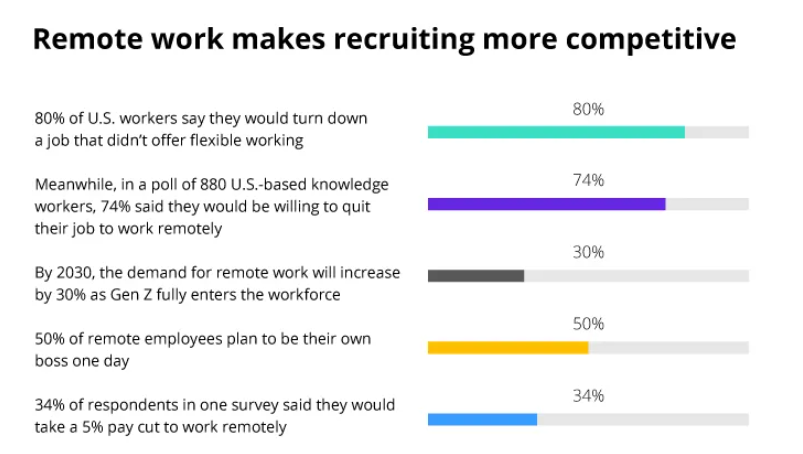 Source: Wrike
Source: Wrike
Better Employee Retention
Being able to retain crucial talent is a critical concern for businesses of all sizes. After all, the average cost of onboarding a new employee can be between 6 and 9 months’ of a staff member’s salary. As job hopping becomes more common, business leaders need new ways to convince their team members to stick with their business for as long as possible.
Fortunately, companies offering remote work can experience a 25% lower turnover than those who don’t. Remote work ensures employees are more likely to stick around and invest themselves into their job with your company.
Reduced Absenteeism
Remote work also ensures you can get the most out of your employees while they’re working with your business. When people have the freedom to work from home, they’re less likely to call in sick just because they’re feeling a little under the weather, and don’t want to manage the commute.
Remote working gives employees more freedom to work at their own pace when they’re unwell or dealing with a personal issue, so they’re less inclined to take time off. However, employees should be careful not to encourage staff to keep working when they really do need time off.
Better Disaster Preparedness
Remote work became a must-have initiative during the pandemic, when office buildings were shut down to avoid the spread of the virus. In the same way, one of the biggest benefits of remote work for employers, is it can help them to prepare for any potential disaster.
With remote working opportunities in place, employees can continue to work regardless of what might be going on with your physical office. This ensures companies don’t have to worry as much about unpredictable downtime.
Lower Carbon Footprint
It’s not just employees who are concerned about their environmental impact these days. Consumers are increasingly searching for companies who share their values when it comes to sustainability and protecting the planet.
A good remote work strategy can help to demonstrate how green your business is. After all, studies show if all the employees in the US who could hold a remote job did, the country could reduce greenhouse gasses by 54 million tons.
Improved Morale
Morale is important in the workplace, because happy employees are generally more productive, less likely to leave the business, and more likely to deliver great results. Remote working opportunities are more likely to create happy employees, with better work/life balance and efficiency levels.
This improved morale can also improve the business culture, and make the company more attractive to new employees when searching for talent.
The future of remote work moving forward
The benefits of remote work are impossible to ignore. Today, countless employees are searching specifically for jobs which allow them to work remotely, while more companies are embracing the power of remote work for boosted productivity and cost savings.
Studies predict around 22% of Americans will be working remotely by 2025 – an 87% increase from pre-pandemic levels. As cloud-based tools continue to evolve, opening new doors for remote collaboration and productivity, the desire for remote work will increase.
Remote work is here to stay. Is it time your business started discovering the benefits for itself?
